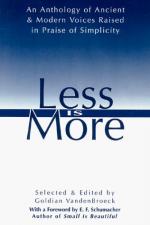
|
| Name: _________________________ | Period: ___________________ |
This test consists of 15 multiple choice questions and 5 short answer questions.
Multiple Choice Questions
1. A child just has to _______ in order to get what he wants, according to the way that we raise children.
(a) Hold out their hand.
(b) Cry.
(c) Sigh.
(d) Stand up.
2. Leisure is not the same thing as _________, according to the book, and it needs to be approached in a different way.
(a) Truth.
(b) Laziness.
(c) Poverty.
(d) Idleness.
3. Whitman is against living with animals because they are not demented with the _________ of owning things, according to the book.
(a) Depression.
(b) Mania.
(c) Distraction.
(d) Boredom.
4. ________ speaks to the reader of the inherent fear of worry of losing the riches one has, according to the book.
(a) Seneca.
(b) Gandhi.
(c) Milton.
(d) Morton.
5. The prayer in Mannes' piece of writing gives thanks to the god of plenty, the god of profit, and the goddess of __________.
(a) Truth.
(b) Fashion.
(c) Convenience.
(d) Understandng.
6. Marcus Aurelius speaks of a ______ life so busy that it has no leisure, according to the book, which is not pleasant to him.
(a) Satisfactory.
(b) Boring.
(c) Dismal.
(d) Full.
7. Emerson points out that children often miss out on the real __________ of the sun and the moon and the water, according to the book.
(a) Powers.
(b) Treasures.
(c) Realities.
(d) Truths.
8. Being a _________ means that one makes the decision to live a simple life that is devoid of distractions, according to the book.
(a) Doctor.
(b) Philosopher.
(c) Banker.
(d) Writer.
9. If the individual does not ______ what is being produced by those who are in power, then he will begin to take away the power of that company.
(a) Buy.
(b) Ignore.
(c) Find.
(d) Understand.
10. Saint Bernard says that he does not notice the _________ of his method of getting around, according to the book.
(a) Effectiveness.
(b) Truth.
(c) Power.
(d) Magnificence.
11. What is NOT one of the three main threats to the world, according to the book's discussion in this section?
(a) Ignorance.
(b) Diabetes.
(c) Over-population.
(d) Militarism.
12. _________, says Robert Henri, is a privilege that one is willing to pay for, which is why it is so special, according to the book.
(a) Creativity.
(b) Artistic poverty.
(c) Art life.
(d) Poverty.
13. Too often, the beauty and the size of one's _______ becomes more important than its cost.
(a) Office.
(b) Home.
(c) Book study.
(d) Car.
14. No ________ can surpass simplicity, according to St. Francois de Sales, according to this section of the book.
(a) Word.
(b) Artifice.
(c) Home.
(d) Stone.
15. Robert ______ writes in 1923 that there are three elements in a beautiful life, according to the book.
(a) Seneca.
(b) Thoreau.
(c) Henri.
(d) Smith.
Short Answer Questions
1. __________ can become a hindrance to the journey while also being a disturbance on the way to victory, according to the book.
2. A ________ education is one that gives man his freedom, the freedom to think and to create, according to the book.
3. Gandhi has experienced both ________ and poverty, but chooses poverty as this seems to help his work.
4. Lewis Mumford says that a person through _______ and rejection can free himself from the powerful, according to the book.
5. ________ advocates a luxury that has nothing to do with money, rather he sees it as food for the soul, according to the book.
|
This section contains 496 words (approx. 2 pages at 300 words per page) |

|




